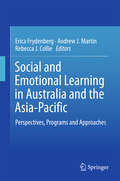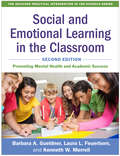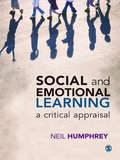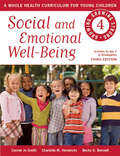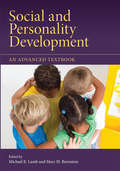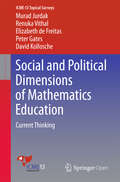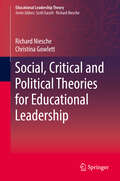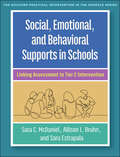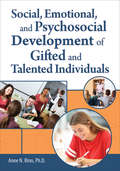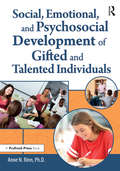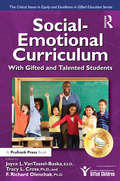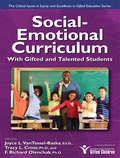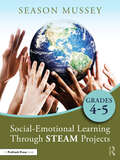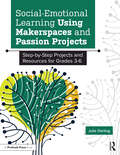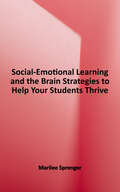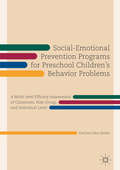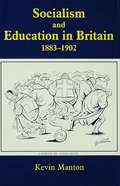- Table View
- List View
Social and Emotional Learning in Australia and the Asia-Pacific
by Erica Frydenberg Andrew J. Martin Rebecca J. CollieAround the globe, there is a growing awareness of the importance of addressing students' social and emotional development and wellbeing during schooling. Although the bulk of the work in this area has been conducted in North America and Europe, there is now a burgeoning interest in this topic in Australia and the wider Asia Pacific. This book is the first ever to provide a timely and important collection of diverse perspectives on and approaches to social and emotional learning in the Australian and Asia Pacific context. Adopting a broad view of social and emotional learning, the book explores positive psychology, belonging, teachers' professional development, pre-service training and post-initial training in Australia and in neighbouring communities such as China, Hong Kong, Korea, Singapore, New Zealand, Fiji, and other Pacific nations. "Frydenberg, Martin, and Collie have provided an incredible service by bringing together in a single well planned scholarly volume an incredible and well balanced group of senior and early career cutting edge researchers from Australia, Asia and the Asia Pacific area tackling approaches and key issues of social and emotional learning. Their much needed volume links research on key factors, such as differing perspectives, measurement issues, the identification of at-risk children, teachers' social and emotional development, and these and other across the cultures of an increasingly vibrant and developing geographic region. It is indeed encouraging to gain the sense of depth and breadth of ongoing research that the volume gives. " John Roodenburg PhD FAPS MCEDP MCCOUNSP, Monash University Melbourne "Social and Emotional Learning is understood to be a crucial part of the school curriculum. This book covers the field, with a refreshing focus on work being done in Australia and in neighbouring countries. For school psychologists, the book helps us to understand how SEL can help at every level - from working with individuals, small groups, whole classes, or with the entire school. Our work with vulnerable students, individually or in small groups, is always more effective when embedded in the broader context of Social and Emotional Learning. " Paul Bertoia FAPS MCEDP, Senior School Psychologist "This collected volume of researchers from Australia and the Asia-Pacific provides a thorough review of important educational, social, and emotional development issues for practitioners and researchers around the world. Readers will greatly benefit from the breadth and depth of treatment in each of the topics covered. " Kit-Tai Hau, PhD, Choh-Ming Li Professor of Educational Psychology, The Chinese University of Hong Kong.
Social and Emotional Learning in the Classroom: Promoting Mental Health and Academic Success (The Guilford Practical Intervention in the Schools Series)
by Kenneth W. Merrell Barbara A. Gueldner Laura L. FeuerbornThis trusted resource--now in a thoroughly updated second edition reflecting the tremendous growth of the field--provides a best-practice guide to planning and implementing social and emotional learning (SEL) in K–12 classrooms and schools. The authors present a roadmap to help practitioners choose exemplary programs and strategies, integrate SEL with academics and mental health interventions, create culturally affirming programming for diverse students, use assessment to guide data-based decision making, and support educator SEL. In a convenient large-size format, the volume includes illustrative vignettes and 24 reproducible worksheets and other practical tools. Purchasers get access to a Web page where they can download and print the reproducible materials. New to This Edition *Chapter on educators&’ social and emotional competence and teacher wellness. *Expanded coverage of implementation and systems issues, strategies for weaving SEL into the school day, applying SEL within a multi-tiered system of support, and professional development. *Numerous new and revised worksheets--now downloadable--including new educator reflection activities in each chapter. *Timely topics and themes infused throughout--such as culturally responsive and trauma-informed practices, teacher–family–community partnerships, and relationships as a foundation to SEL success--plus updated SEL resources. This book is in The Guilford Practical Intervention in the Schools Series, edited by Sandra M. Chafouleas.
Social and Emotional Learning: A Critical Appraisal
by Neil Humphrey'A landmark book for SEL. It provides an even-handed, scholarly appraisal of the latest research. This major contribution will advance SEL science, improve school-based practice, and benefit many students' -Professor Roger Weissberg, University of Illinois at Chicago This important new book provides the first in-depth, authoritative and balanced examination of the critical issues pervading Social and Emotional Learning (SEL). The book highlights strengths and flaws in SEL theory and research, and sets the agenda for the next generation of inquiry. The book investigates key topics such as: - definitions and conceptualization - origins and influences - international policy and practice - assessment and monitoring - implementation - outcomes It will be valuable to researchers, policy-makers, students, teachers, and anyone interested in the role of schools play in promoting children's social and emotional wellbeing. Neil Humphrey is Professor of Psychology of Education at the University of Manchester
Social and Emotional Well-Being
by Becky S. Bennett Connie Jo Smith Charlotte M. HendricksYoung children are better able to cope with their ever-changing world, overcome obstacles, and grow into emotionally healthy adults if they are provided opportunities to build their self-awareness and confidence. Help children appreciate themselves and others, explore relationships, and develop coping mechanisms for dealing with change and difficult events in their lives as they learn about self-esteem, emotions and feelings, family, friends, and changes in life.The curriculum includesOverviews of the six social and emotional well-being topicsSuggested interest area materials and supports for creating the learning environmentLearning objectives and vocabulary words to introduce and useSuggestions for evaluating children's understanding of each topicMore than 30 hands-on classroom activitiesFamily information and take-home activitiesThis book is part of the Growing, Growing Strong series, a whole-health curriculum for children age three though kindergarten. Together, the books provide a complete set of activities and resources to help you support children's growth and wellness.
Social and Personality Development: An Advanced Textbook
by Marc H. Bornstein Michael E. LambThis new text contains parts of Bornstein and Lamb’s Developmental Science, 6th edition, along with new introductory material, providing a cutting edge and comprehensive overview of social and personality development. Each of the world-renowned contributors masterfully introduces the history and systems, methodologies, and measurement and analytic techniques used to understand the area of human development under review. The relevance of the field is illustrated through engaging applications. Each chapter reflects the current state of knowledge and features an introduction, an overview of the field, a chapter summary, and numerous classical and contemporary references. As a whole, this highly anticipated text illuminates substantive phenomena in social and personality developmental science and its relevance to everyday life. Students and instructors will appreciate the book’s online resources. For each chapter, the website features: chapter outlines; a student reading guide; a glossary of key terms and concepts; and suggested readings with hotlinks to journal articles. Only instructors are granted access to the test bank with multiple-choice, short-answer, and essay questions; PowerPoints with all of the text’s figures and tables; and suggestions for classroom discussion/assignments. The book opens with an introduction to social and personality development as well as an overview of developmental science in general—its history and theory, the cultural orientation to thinking about human development, and the manner in which empirical research is designed, conducted, and analyzed. Part 2 examines personality and social development within the context of the various relationships and situations in which developing individuals function and by which they are shaped. The book concludes with an engaging look at applied developmental psychology in action through a current examination of children and the law. Ways in which developmental thinking and research affect and are affected by practice and social policy are emphasized. Intended for advanced undergraduate and/or graduate level courses on social and personality development taught in departments of psychology, human development, and education, researchers in these areas will also appreciate this book’s cutting-edge coverage.
Social and Political Dimensions of Mathematics Education
by Elizabeth De Freitas Murad Jurdak Renuka Vithal Peter Gates David KolloscheThis book examines the current thinking on five critical social and political areas in mathematics education. It focuses on material conditions in teaching and learning, and details features of social life and their influence on mathematics teaching, learning and achievement. Following an introduction, the first section addresses equitable access and participation in quality mathematics education. It explores this issue in different contexts and from different ideological perspectives. The second section traces the emergence and development of the notion of activism in mathematics education in theory, in the literature, in research and in practice. The third section then moves on to explore current research on the political forces at work in identity, subjectivity and (dis)ability within mathematics education, showing how emphasis on language and discourse provides information for this research, and how new directions are being pursued to address the diverse material conditions that shape learning experiences in mathematics education. Economic factors behind mathematics achievement form the topic of section four, which examines the political dimensions of mathematics education through the influence of national and global economic structures. The final section addresses distribution of power and cultural regimes of truth, based on the premise that although often deemed apolitical, mathematics and mathematics education are highly political institutions in our society. The book concludes with a summary and recommendations for the future.
Social and Population Education Class 7 (English Version)-NEPAL
by Nepal Curriculum CenterThis accessible book has been developed by Action on Disability Rights And Development-Nepal (ADRAD) for the free distribution to students with visual and print disabilities in cooperation of Curriculum Development Center and Australian Embassy in Nepal under Direct Aid Program.
Social class 6 - Andhra Pradesh Board: సామాజిక తరగతి 6 - ఆంధ్రప్రదేశ్ బోర్డు
by Sri K. Lakshminarayana Sri K. Subrahmanyam Sri Korivi Srinivasarao K. Lakshmareddy Sri Madathati Narasimhareddy Srimathi T.S. Malliswari Sri B. Srinivasulu Sri S. Rahmatullah Sri C.H. Radhakrishna Srimathi B. Sarala Sri B. Shankarrao Sri Mohan Reddy Sri U. Anand KumarThis is the text book prescribed for Social Studies for the students of 6th class in Telugu Medium in Andhra Pradesh.
Social class 6 - Telangana Board: సామాజిక తరగతి 6 - తెలంగాణ బోర్డు
by Sri K. Subrahmanyam Sri Korivi Srinivasarao Sri Malyala Papayya Sri Vanguri Gangireddy K. Lakshmareddy Sri Madathati Narasimhareddy Srimathi T.S. Malliswari Sri B. Srinivasulu Sri C.H. Radhakrishna Srimathi B. Sarala Sri B. Shankarrao Sri Mohan Reddy Sri Ayachitula Lakshmanarao Dr R. Ganapati Sri P. Rathanga Paani Reddy Dr Chakinala Srinivas Sri U. Anand Kumar Sri K Lakshminarayana Sri N.S. JagannadhThis is the text book prescribed for Social Studies for the students of 6th class in Telugu Medium in Telangana.
Social class 7 - Andhra Pradesh Board: సామాజిక తరగతి 7 - ఆంధ్రప్రదేశ్ బోర్డు
by Sri K. Lakshminarayana Sri Korivi Srinivasarao Sri P. Srinivasulu Sri Madathati Narasimhareddy Sri C.H. Radhakrishna Sri Ayachitula Lakshmanarao Srimati S. Suvarnadevi Sri T. Ramakrishna Srimati B. Sarala Sri A.R. Rameshrao Dr Raacharla Ganapati Dr B. V. N. Swamy Sri K. KumaraswamyThis is the text book prescribed for Social Studies to the students of 7th class, Telugu Medium in Andhra Pradesh.
Social class 7 - Telangana Board: సామాజిక తరగతి 7 - తెలంగాణ బోర్డు
by Dr Racharla Ganapati Sri K. Lakshminarayana Sri K. Subrahmanyam Sri Korivi Srinivasarao Sri Malyala Papayya Sri P. Srinivasulu Sri Vanguri Gangireddy Sri Madathati Narasimhareddy Sri C.H. Radhakrishna Dr Chakinala Srinivas Sri Ayachitula Laxmanarao Srimati S. Suvarnadevi Sri T. Ramakrishna Sri K. Kumaraswami Srimati B. Sarala Sri P.V. Krishnaarao Sri A.R. Rameshrao Sri P.Rathanga Pani Reddy Sri U. Anandkumar Sri N.C. Jagannadh B. V. N. SwamiThis is the text book prescribed for Social Studies to the students of 7th class, Telugu Medium in Telangana.
Social class 8 - Andhra Pradesh Board: సామాజిక తరగతి 8 - ఆంధ్రప్రదేశ్ బోర్డు
by ScertThis is the text book prescribed for Social Studies to the students of 8th class, Telugu Medium in Andhra Pradesh.
Social class 8 - Telangana Board: సామాజిక తరగతి 8 - తెలంగాణ బోర్డు
by ScertThis is the text book prescribed for Social Studies to the students of 8th class, Telugu Medium in Telangana.
Social class 9 - Andhra Pradesh Board: సామాజిక తరగతి 9 - ఆంధ్రప్రదేశ్ బోర్డు
by ApscertThis is the text book prescribed for Social Studies to the students of 9th class, Telugu Medium in Andhra Pradesh.
Social, Critical and Political Theories for Educational Leadership (Educational Leadership Theory)
by Richard Niesche Christina GowlettThis book makes the case for the continued and expanded use of social, critical and political theories in the field of educational leadership. It helps readers understand educational leadership by introducing them to a wide variety of theoretical and philosophical approaches and positions. The book incorporates a rich blend of ideas and concepts, and compares and contrasts the approaches discussed.The content largely focuses on four educational thinkers: Michel Foucault, Judith Butler, Bernard Stiegler and Karen Barad. The chapters do not cover each thinker’s oeuvre exhaustively, but instead provide a brief overview of his/her ideas, while also helping readers understand a particular aspect of the educational leadership discourse. Each chapter also provides supplementary reading recommendations for those interested in pursuing these ideas in more depth.
Social, Emotional, and Behavioral Supports in Schools: Linking Assessment to Tier 2 Intervention (The Guilford Practical Intervention in the Schools Series)
by Sara C. McDaniel Allison L. Bruhn Sara EstrapalaMeeting a critical need, this accessible guide addresses the "whats," "whys," and "how-tos" of developing and implementing effective Tier 2 social, emotional, and behavioral supports. The book provides explicit steps for identifying K–12 students who could benefit from Tier 2, matching evidence-based interventions to student needs, and making individualized, data-based decisions regarding adapting, fading, or intensifying supports. Chapters review exemplary interventions in the areas of conduct, self-regulation, social issues, emotional issues, and co-occurring academic and social–emotional–behavioral needs. The place of Tier 2 in schoolwide positive behavioral interventions and supports (PBIS) is explained, and keys to implementation fidelity are highlighted. In a large-size format for easy photocopying, the book includes 23 reproducible forms and checklists that can also be downloaded and printed. This book is in The Guilford Practical Intervention in the Schools Series, edited by Sandra M. Chafouleas.
Social, Emotional, and Psychosocial Development of Gifted and Talented Individuals
by Anne RinnSocial, Emotional, and Psychosocial Development of Gifted and Talented Individuals:Merges the fields of individual differences, developmental psychology, and educational psychology with the field of gifted education.Provides a complete overview of the social, emotional, and psychosocial development of gifted and talented individuals.Explores multiple paradigmatic lenses and varying conceptions of giftedness.Serves as a comprehensive resource for graduate students, early career scholars, and teachers.Addresses implications for the field of gifted education and future research.This book is framed around four broad questions: (a) What is development?, (b) Are gifted individuals qualitatively different from others?, (c) Which psychosocial skills are necessary in the development of talent?, and (d) What effect does the environment have on the development of talent? Topics covered include developmental trajectories, personality development, social and emotional development, perfectionism, sensory sensitivity, emotional intensity, self-beliefs, motivation, systems perspective, psychosocial interventions, and counseling and mental health.
Social, Emotional, and Psychosocial Development of Gifted and Talented Individuals
by Anne RinnSocial, Emotional, and Psychosocial Development of Gifted and Talented Individuals:Merges the fields of individual differences, developmental psychology, and educational psychology with the field of gifted education.Provides a complete overview of the social, emotional, and psychosocial development of gifted and talented individuals.Explores multiple paradigmatic lenses and varying conceptions of giftedness.Serves as a comprehensive resource for graduate students, early career scholars, and teachers.Addresses implications for the field of gifted education and future research.This book is framed around four broad questions: (a) What is development?, (b) Are gifted individuals qualitatively different from others?, (c) Which psychosocial skills are necessary in the development of talent?, and (d) What effect does the environment have on the development of talent? Topics covered include developmental trajectories, personality development, social and emotional development, perfectionism, sensory sensitivity, emotional intensity, self-beliefs, motivation, systems perspective, psychosocial interventions, and counseling and mental health.
Social-Emotional Curriculum With Gifted and Talented Students
by F. Richard Olenchak Tracy L. Cross Joyce Van Tassel-BaskaA gifted education Legacy Award winner, Social-Emotional Curriculum With Gifted and Talented Students provides a thorough introduction to methods for developing social-emotional curricula for use with gifted and talented learners in the school setting. Including overviews of strategies that work for implementing social-emotional strategies in the everyday curricula, this book, part of the Critical Issues in Equity and Excellence series, a joint publication project of the National Association for Gifted Children and Prufrock Press, combines research and experience from leading scholars in the field of the affective needs of gifted students in a convenient guide for teachers, administrators, and gifted education program directors. The book covers theories to guide affective curricula, the needs of minority students, models to develop social-emotional curricula, tips for counseling gifted students, and strategies to promote the social-emotional needs of gifted students, along with discussions of suicide prevention among this population, the use of bibliotherapy and discussion groups, and the teacher-counselor connection in affective curricula. This handy guide to developing social-emotional curricula for gifted students is a necessity for anyone serving and working with this population.Educational Resource
Social-Emotional Curriculum With Gifted and Talented Students
by Tracy L. Cross Joyce L. VanTessel-BaskaSocial-Emotional Curriculum With Gifted and Talented Students provides a thorough introduction to methods for developing social-emotional curricula for use with gifted and talented learners in the school setting. Educational Resource
Social-Emotional Learning Through STEAM Projects, Grades 4-5
by Season MusseySocial-Emotional Learning Through STEAM Projects, Grades 4–5 helps educators target the development of social and emotional learning (SEL) competencies for high-ability learners through interdisciplinary, project-based inquiry. Aligned with STEAM content standards, each of the nine projects introduces students to a real-world problem through essential questions and the presentation of a primary source document. Both the content and the inquiry process support SEL competency development, from self-awareness to selfmanagement, social awareness, relationship skills, and responsible decision-making. As students work to understand and pose solutions to each problem, they gain the knowledge and practical skills needed to become more socially and emotionally competent individuals in their classroom communities.
Social-Emotional Learning Using Makerspaces and Passion Projects: Step-by-Step Projects and Resources for Grades 3-6
by Julie DarlingSocial-Emotional Learning Using Makerspaces and Passion Projects is chock-full of meaningful projects that educators can use to teach social-emotional skills in grades 3-6. The projects show students how to create a digital calming room, prototype an inclusive playground, and make recycled cards with paper circuits to spread kindness. They also teach young makers how to focus on self-regulation and self-care, engage in community outreach by helping struggling families, and tell their own stories using podcasting and green screening. In addition, the book provides teachers with helpful strategies for scaffolding passion projects, funding a makerspace, and tips for building community and celebrating diversity. With the engaging ideas in this book, educators will be able to help their students build direct connections to social awareness, relationship skills, responsible decision-making, self-management, and self-awareness (CASEL’s SEL Framework).
Social-Emotional Learning and the Brain: Strategies to Help Your Students Thrive
by Marilee SprengerToday's teachers face a daunting challenge: how to ensure a positive school experience for their students, many of whom carry the burden of adverse childhood experiences, such as abuse, poverty, divorce, abandonment, and numerous other serious social issues. Spurred by her personal experience and extensive exploration of brain-based learning, author Marilee Sprenger explains how brain science we know about how the brain works can be applied to social-emotional learning. Specifically, she addresses how to: - Build strong, caring relationships with students to give them a sense of belonging. - Teach and model empathy, so students feel understood and can better understand others. - Awaken students' self-awareness, including the ability to name their own emotions, have accurate self-perceptions, and display self-confidence and self-efficacy. - Help students manage their behavior through impulse control, stress management, and other positive skills. -Improve students' social awareness and interaction with others. -Teach students how to handle relationships, including with people whose backgrounds differ from their own. - Guide students in making responsible decisions. Offering clear, easy-to-understand explanations of brain activity and dozens of specific strategies for all grade levels, Social-Emotional Learning and the Brain is an essential guide to creating supportive classroom environments and improving outcomes for all our students and dozens of specific strategies for all grade levels, Social-Emotional Learning and the Brain is an essential guide to creating supportive classroom environments and improving outcomes for all our students.
Social-Emotional Prevention Programs for Preschool Children's Behavior Problems
by Catrinel Alice ŞtefanThis book is aimed at exploring the relevance of social-emotional competencies for preventing preschool children’s behavior problems. The content provides an overview of how evidence from fundamental research on social-emotional competencies can be translated in applied research for developing prevention programs. The Social-Emotional Prevention program framework is presented as a multi-focused (child, teacher, parent), hybrid approach for both high risk and non-risk preschoolers. The book offers a systematic and in depth evaluation of SEP efficacy including classroom, risk group, and individual level effects. Hence, the proposed approach employs different research designs and statistical methods to explore how behavioral changes occur as a result of children’s participation to the intervention. Each study’s findings are discussed in terms of corresponding implications for practice in schools, but also from a broader perspective including implications for policy makers in the field of early education.
Socialism and Education in Britain 1883-1902 (Woburn Education Series)
by Kevin MantonExamines the British socialist movement in the last two decades of the 19th century through its policies on children's education. The author reassesses the nature of these policies and comments on the validity of those historiographical models used in analyses of the socialism of this period.
